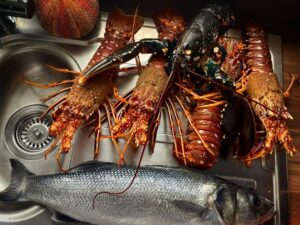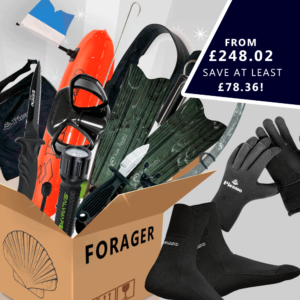Home / Guides / Foraging
In our Foraging guides we show you how to forage, especially along the coastline, for a really accessible and rewarding way to obtain high quality, fresher food than what’s typically available in the supermarkets, all at significantly lower cost.
We hope we’ve inspired you in our previous foraging posts to get out onto the coastline and start helping yourself from the ocean’s larder. If you’re new to foraging, it really is a great way to put beautiful fresh food on the table, for free! Look at these typical supermarket prices for comparison! Are you … Read more
Seaweed really is the superfood of the sea: it is an incredibly healthy food choice. As coastal foraging goes, it’s a pretty easy pick because it’s always available in abundance!
This foraging guide explains how to find and forage crabs, lobsters, octopus and kina in the shallow waters.
In this article we’ll talk about what you can find to fill your larder by foraging along the coastline, with tips and tricks for collecting each species.
In this article we’ll talk about why you should get into foraging, what you can forage, what equipment you need and laws to be aware of.
Foraging FAQs
What is the meaning of foraging?
Foraging refers to the activity of searching for and collecting food resources in the wild. Modern foraging connects people with nature, and is popular both as a hobby and a sustainable way to gather food, emphasising the use of local and natural resources.
What is a forager?
A forager is someone who actively searches for and collects wild food resources from natural environments, including coastlines, forests, and fields, focusing on sustainable and ethical harvesting practices of plants, fungi, shellfish and more.
Why should I go foraging?
Foraging offers an easy and practical alternative to manage soaring food prices, allowing you to gather fresh, natural food for free. It enables you to avoid commercially grown produce that often contains growth hormones, pesticides, and antibiotics, promoting a healthier diet and a sustainable lifestyle.
What is coastal foraging?
Coastal foraging is searching and collecting food such as crustaceans and mollusks from along the coastline, either on the shore, sea bed or shallow waters.
What are crustaceans?
By definition, they are aquatic animals with a hard exoskeleton, jointed limbs, and two pairs of antennae. Crustaceans you can forage include crabs, lobsters, crayfish, and shrimp.
What are mollusks?
They are creatures typically with a shell. Mollusks you can forage include clams, oysters, mussels, scallops, and snails.



